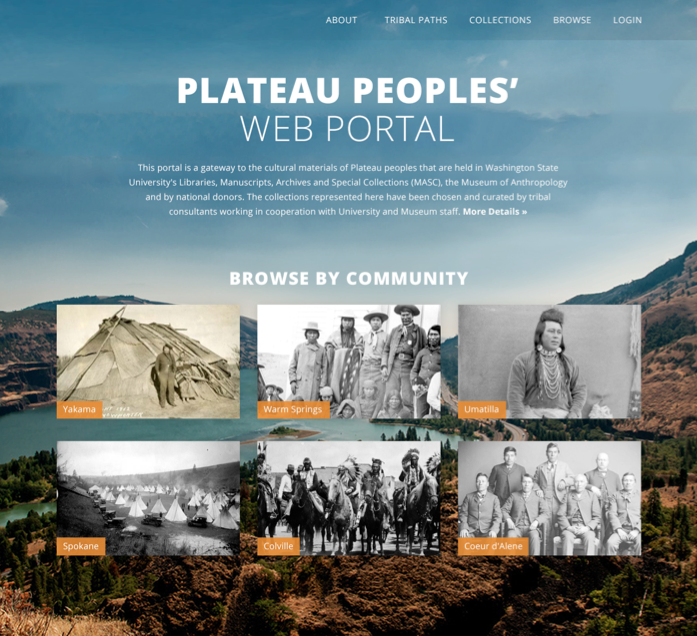Source: https://news.wsu.edu/news/2020/10/09/mellon-grant-boosts-digital-stewardship-indigenous-cultural-materials/
Oct. 9, 2020
By Adriana Aumen, College of Arts and Sciences
PULLMAN, Wash. – Washington State University researchers working to enable digital repatriation of Native American cultural heritage materials received a $700,000 grant from The Andrew W. Mellon Foundation for the next phase of an innovative, community-driven curation program.
The award supports implementation of the Mukurtu Shared platform and the collaborative curation method developed at WSU for digitally sharing Native American cultural materials housed at the Smithsonian Institution and the Library of Congress.
Part of the unique Mukurtu CMS software initiative, Mukurtu Shared will allow the materials to be ethically and collaboratively curated in the online environment by indigenous communities using standardized, replicable workflows and freely available digital tools, said Kimberly Christen, professor and director of the Digital Technology and Culture Program in the College of Arts and Sciences (CAS) and a principal investigator for the grant.
“Respecting indigenous values and knowledge, this method incorporates local Native American protocols for attribution, access, review, vetting and labeling of cultural heritage materials,” Christen said.
The two-year grant is the third and largest award from the Mellon Foundation to support the broader Mukurtu project, which is directed by Christen and managed through WSU’s Center for Digital Scholarship and Curation(CDSC). Since the project’s inception in 2015, the CDSC and associated Mukurtu initiatives have brought almost $4 million in external funds to WSU for promoting ethical curation and digital stewardship training with Native American communities, further advancing the university’s land-grant mission.

Mukurtu’s selective sharing and vetting in features, along with the protocol level management and access functionality, balance the cultural needs of communities with the desire of non-Indigenous institutions desire to share content more publicly.
https://www.dlib.org/dlib/may17/christen/05christen.html
Mukurtu Fellows assist with recovering collections
In addition to being geographically and institutionally dispersed, collections held in federal institutions are massive in size and scope, with varying tools provided for discovery – factors that make accessing all materials related to their communities difficult for Native American groups with limited resources.
Through the new grant, two researchers, designated Mukurtu Fellows, will continue to work onsite at federal repositories in Washington, D.C., while collaborating virtually with Native American staff at the eight partner tribal institutions nationwide to ensure continuity and sustainability.
“The program is unique in establishing shared research processes to help alleviate the burdens on Native American communities as they seek to recover collections,” Christen said.
The Mukurtu Fellows program is “priceless to our vision of discovering and providing access to histories that would otherwise go undiscovered by the people it means the most to,” said Amelia Wilson, director of the Huna Heritage Foundation.
“The amount of research done through this project would have been very cost-prohibitive to be done by the tribe,” said James Francis Sr., tribal historian for the Penobscot Nation.
The new grant funds will allow the project team to complete production of additional open-source tools for the Mukurtu Shared platform, with added functionalities for collaborative curation, said Alex Merrill, head of systems and technical operations for WSU Libraries and co-principal investigator for the grant.
Communities are groups of users who are united by some form of relationship or membership rules. Cultural protocols help to organize those communities by defining who has access to specific digital heritage content. Here, protocols are defined by age and gender. A user can be a member of multiple communities and/or protocols. Finally, categories are useful for organizing and searching for relevant content. Categories can crosscut protocols, communities, and digital heritage items.
https://www.mdpi.com/2571-9408/5/1/16
Ongoing training for staff at federal repositories and at tribal institutions will be provided through creation of free resources to support use of the digital tools and curation methods.
Because the encounters and context of information in the collections are sometimes emotionally and psychologically triggering for tribal community members, said Nicole Myers-Lim (Pomo), director of the California Museum and Cultural Center, “it is beneficial not only to have someone dedicating time to the research but they also serve as buffer between the colonial context in which our cultural heritage was appropriated into these collections.”
A joint initiative of CAS and WSU Libraries, the CDSC promotes collaborations that use technology in ethically minded and socially empowering ways and advance WSU’s modern land-grant mission and Drive to 25 initiative by promoting social justice through digital scholarship, research and outreach.
Mukurtu Web Tutorial: https://vimeo.com/252934484
